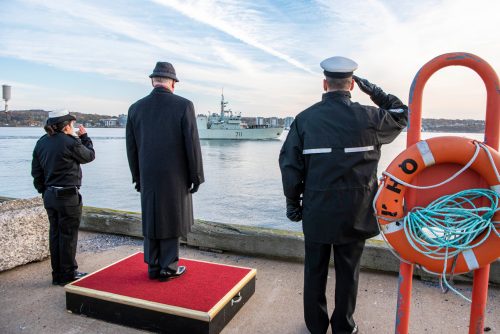
The Honourable Arthur J. Leblanc, ONS, QC, Lieutenant Governor of Nova Scotia and Commodore Richard Feltham, Commander Canadian Fleet Atlantic, takes the salute as HMCS Summerside departs on a 2-month deployment to the Caribbean Sea on Operation Caribee in October 2020. [Combat Camera/Mona Ghiz, Marlant]
The Royal Canadian Navy has renamed its junior ranks to better reflect what its commander called the “ever-evolving international and domestic contexts in which we live and operate.”
As part of that effort, the navy has dispensed with its ‘Seaman’ ranks, renaming them the gender-neutral ‘Sailor.’
Vice-Admiral Art McDonald, the navy commander, said the service’s public consultations on the proposed change collected almost 18,000 opinions from serving, veteran and civilian respondents, more than 75 per cent of whom supported the move.
“I was especially appreciative of the overwhelming participation by the junior ranks who will be most impacted,” McDonald wrote in an open letter.
The initiative, he added, prompted “frank and passionate” discussion online and in offices, shops and messes about the options and reasons for the change.
“What we have been discussing is our culture,” he told the 13,000-member force. “We’ve been discussing who we are. Obviously, I encourage this reflection to continue—the introspection and dialogue being foundational to a vibrant, appropriate and ever-evolving naval/force culture…to getting it right!”
The changes, McDonald said, are about more than attracting and recruiting new members.
“At its essence, this initiative is about nothing less than ensuring that our navy strives to keep pace with the society we serve so as to remain exactly the service that Canadians want to represent them in the world’s darkest corners when principles and values matter.”
The new ranks, effective Sept. 4, are: Sailor Third Class (formerly Ordinary Seaman), Sailor Second Class (Able Seaman), Sailor First Class (Leading Seaman) and Master Sailor (Master Seaman). All will be informally referred to as ‘Sailor’ except the most senior of the junior ranks, Master Sailor—roughly equivalent to a master corporal in the army.
They have traditionally been the grunts of the seaborne complement, doing the lion’s share of the heavy lifting aboard ship, although their roles have become increasingly complex with the evolution of naval technology.
McDonald asserted that the initiative couldn’t wait.
“An enduring effort, especially one involving culture, can be stalled by the failure to incrementally effect change,” said the admiral. “We cannot burden the next watch with what we can and must do today. Progress needs be realized on the current watch…now…on our watch.”
Advertisement

















